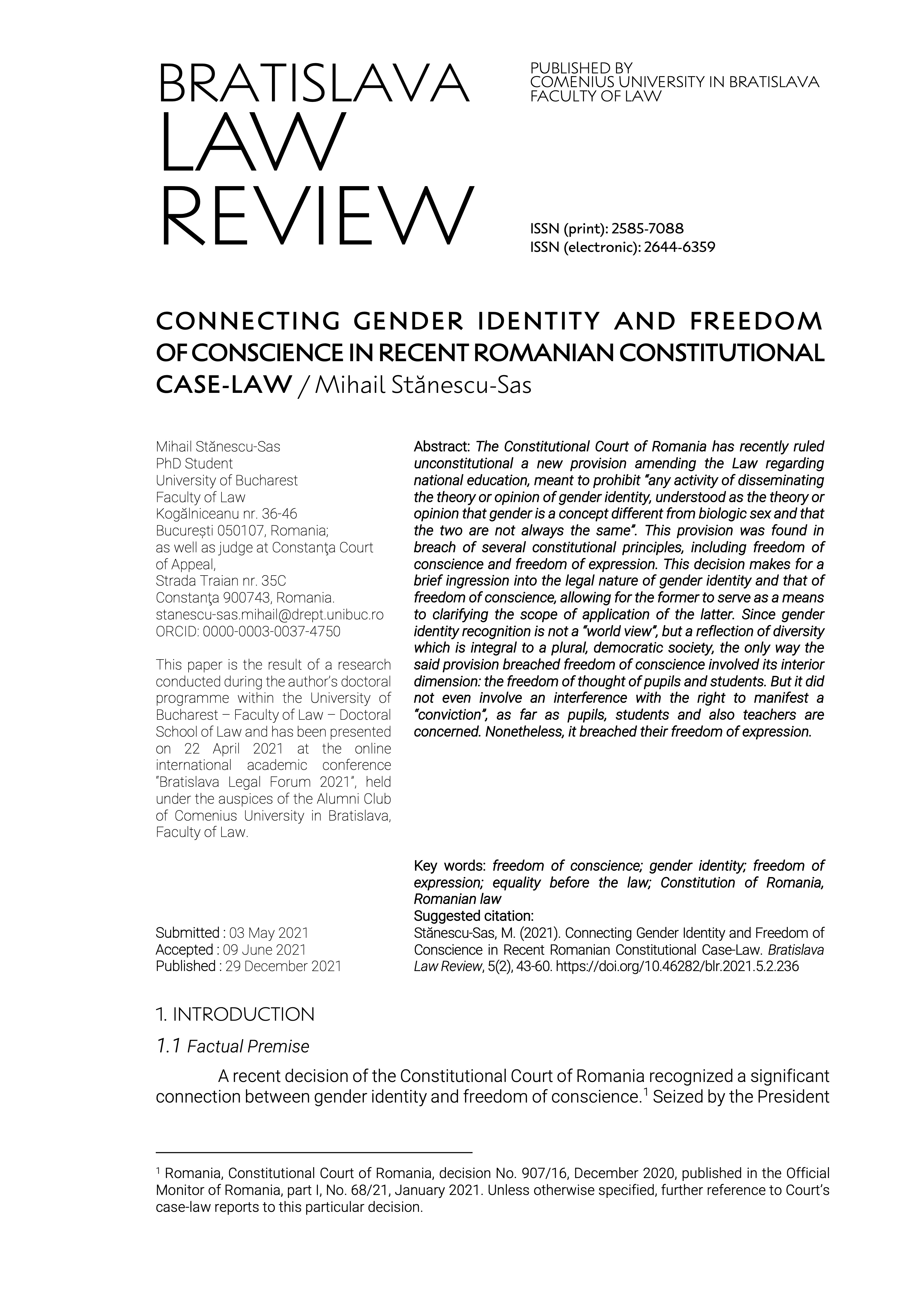Connecting Gender Identity and Freedom of Conscience in Recent Romanian Constitutional Case-Law
DOI:
https://doi.org/10.46282/blr.2021.5.2.236Keywords:
freedom of conscience, gender identity, freedom of expression, equality before the law, Constitution of Romania, Romanian lawAbstract
The Constitutional Court of Romania has recently ruled unconstitutional a new provision amending the Law regarding national education, meant to prohibit “any activity of disseminating the theory or opinion of gender identity, understood as the theory or opinion that gender is a concept different from biologic sex and that the two are not always the same”. This provision was found in breach of several constitutional principles, including freedom of conscience and freedom of expression. This decision makes for a brief ingression into the legal nature of gender identity and that of freedom of conscience, allowing for the former to serve as a means to clarifying the scope of application of the latter. Since gender identity recognition is not a “world view”, but a reflection of diversity which is integral to a plural, democratic society, the only way the said provision breached freedom of conscience involved its interior dimension: the freedom of thought of pupils and students. But it did not even involve an interference with the right to manifest a “conviction”, as far as pupils, students and also teachers are concerned. Nonetheless, it breached their freedom of expression.
References
Blackburn S. (2016). The Oxford Dictionary of Philosophy. Third edition. Oxford: Oxford University Press. 531 pages. ISBN 978-0-19-873530-4. DOI: https://doi.org/10.1093/acref/9780198735304.001.0001
Deaconu Ş. (2020). Drept constituţional. Fourth edition. Bucharest: C.H. Beck. 266 pages. ISBN 978-606-18-1016-1.
Deaconu Ş. (2017). Instituţii politice. Third edition. Bucharest: C.H. Beck. 315 pages. ISBN 978-606-18-0720-8.
Ionescu C. (2017). Commentary of Article 29. In: Ionescu, C. and C. A. Dumitrescu (eds.), Constituţia României. Comentarii şi explicaţii. Bucharest: C.H. Beck, pp. 383-401. ISBN 978-606-18-0681-2.
Muraru I. (2019). Commentary of Article 29. In: Muraru I. and E.-S. Tănăsescu (eds.), Constituţia României. Comentariu pe articole. Second edition. Bucharest: C.H. Beck, pp. 249-256. ISBN 978-606-18-0847-2.
Nehushtan Y. (2018). Intolerant Religion in a Tolerant-Liberal Democracy. Oxford and Portland, Oregon: Hart Publishing. 203 pages. ISBN 978-1-50992-008-2 and 978-1-84946-605-9.
Safta M. (2020). Drept constituţional şi instituţii politice. Vol. II. Instituţii politice. Third edition. Bucharest: Hamangiu. 384 pages. ISBN 978-606-27-0675-3.
Selejan-Guţan B. (2020). Drept constituţional şi instituţii politice. Volume 1. Fourth edition. Bucharest: Hamangiu. 306 pages. ISBN 978-606-27-1643-1.
Stănescu-Sas M. (2020). Impactul măsurilor de prevenţie sanitară dispune în context pandemic asupra manifestării libertăţii conştiinţei. In: Dimitriu O. (ed.), Probleme şi soluţii legale privind criza COVID-19. Bucharest: C.H. Beck, pp. 43-67. ISBN 978-606-18-1000-0.
Sudre F. et al. (2019). Droit européen et international des droits de l’Homme. 14th edition. Paris: Presses Universitaires de France. 946 pages. ISBN 978-2-13-080791-9.
Constitution of Romania, republished in the Official Monitor of Romania, part I, No. 758/29, October 2003.
ECtHR, Bayatyan v. Armenia [GC], App. No. 23459/03, 7 July 2011
ECtHR, Campbell and Cosans v. United Kingdom, App. No. 7511/76 and 7743/76, 25 February 1982
ECtHR, Enver Aydemir v. Turkey, App. No. 26012/11, 07 June 2016
European Commission of Human Rights, Arrowsmith v. United Kingdom, App. No. 7050/75, report of 12 October 1978
European Commission of Human Rights, F.P. v. Germany, App. No. 19459/92, decision of 29 March 1993
Government Ordinance No. 43/2003 regarding the achievement and administrative name change by individuals, published in the Official Monitor of Romania, part I, No. 68/2, February 2003.
Government Ordinance No. 137/2000 regarding the prevention and punishment of all forms of discrimination, republished in the Official Monitor of Romania, part I, No. 166/7, March 2014.
Law No. 1/2011 regarding national education, published in the Official Monitor of Romania, part I, No. 18/10, January 2011.
Law No. 202/2002 regarding the equality of chances and treatment between women and men, republished in the Official Monitor of Romania, part I, No. 326/5, June 2013.
Law regarding the amendment and addend of Law No. 1/2011 regarding national education – project No. PLX617/2019, adopted by the Chamber of Deputies, as Chamber first seized, available at https://www.senat.ro/legis/PDF/2020/20L087FC.PDF (accessed on 15.11.2021).
Law regarding the amendment and addend of Law No. 1/2011 regarding national education – project No. L87/2020, adopted by the Senate, as decisional Chamber, available at: https://www.senat.ro/legis/PDF/2020/20L087LP.PDF (accessed on 15.11.2021).
Romania, Constitutional Court of Romania, decision No. 907/16, December 2020, published in the Official Monitor of Romania, part I, No. 68/21, January 2021.
Romania, Constitutional Court of Romania, decision No. 650/25, October 2018, published in the Official Monitor of Romania, part I, No. 97/7, February 2019.
Romania, Constitutional Court of Romania, decision No. 485/6, May 2008, published in the Official Monitor of Romania, part I, No. 431/9, June 2008.

Downloads
Published
Issue
Section
Categories
License
Copyright (c) 2021 Bratislava Law Review

This work is licensed under a Creative Commons Attribution-NonCommercial-NoDerivatives 4.0 International License.
The Author(s) transfers copyright to the Article to the Publisher of the Journal by the Licence Agreement.
The Author(s) retains rights specified in the Licence Agreement.
The readers may read, download, copy, distribute, print, search, or link to the full texts of all of the Article of the Journal and use them for any other lawful purpose under specified Creative Commons Licence (CC BY-NC-ND 4.0).











